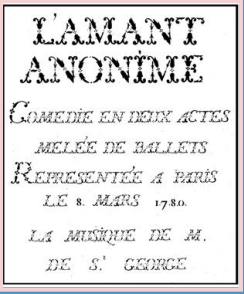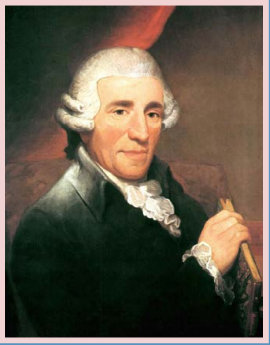Joseph Bologne, Chevalier de SaintGeorges, was one of the innovators that helped to define what is now known as the Classical Period in music – spanning approximately 1750 through 1820.
His earliest works were a series of string quartets and several sonatas written for keyboard and violin, composed in 1770-71. They demonstrate a distinct break from earlier Baroque Period conventions. His sonatas poised the keyboard and violin as equals, differing from the basso continuo Baroque style, which used a steady undercurrent of unobtrusive accompaniment. Bologne wrote some of the first-ever French string quartets, designing formal schemes that are now standard conventions of Classical music. Over the next decade, Bologne honed his compositional voice by incorporating a broadened range of musical colors and textures, writing for many orchestra instruments including woodwinds, strings, brass, and percussion, all without forfeiting musical clarity. As a virtuoso violinist, Bologne was known for writing intricate violin concertos, often asking the soloist to move quickly and dramatically from the highest register of the instrument to the lowest. Bologne invented a new genre of music, the symphonie concertante. With elements of a concerto and a symphony, it combined new and old – the Baroque concerto with the Classical concerto, and featured two or more soloists, often resulting in a sort of musical duel. Joseph Bologne premiered the first of this new form in 1775, with Mozart, Haydn, and others following suit soon after him.
 Bologne also wrote six comic operas in his lifetime, including an opera for children. The popular French opéra comique style was derived from the Italian opera
Bologne also wrote six comic operas in his lifetime, including an opera for children. The popular French opéra comique style was derived from the Italian opera
buffa, but incorporated traditions from vaudeville performances, as well. The opera topics were quotidian (everyday dramas), and the form included musical selections woven together by spoken dialogue rather than sung recitative. Bologne’s opera premieres received mixed reviews overall. His most successful was L’amant anonyme (The Anonymous Lover), which premiered in Paris in 1780 at Madame de Montesson’s private theater. One of this opera’s supporting characters, Dorothée, does not perform any music, and there is some speculation that it was written for Madame to perform, herself. The music is written in
the Classical style, and the vocal lines feature clear melodies. The accompaniment receives near equal treatment to the vocal line, especially when compared with works from the Baroque period. Across the course of even a single piece, Bologne’s writing for the voice was both lively and deeply profound, displaying a wide range of emotions. L’amant anonyme is the only opera of Bologne’s that has survived. The only copy of the score is in the Bibliothèque nationale de France.
 Joseph Bologne was a contemporary of Joseph Haydn (1732-1809) and a great admirer of his work. His earliest compositions were inspired by Haydn’s quartets. Bologne even commissioned Haydn to compose six new symphonies for his orchestra, Le Concert Olympique, known today as Haydn’s “Paris symphonies.” Wolfgang Amadeus Mozart (1756- 1791) was also a contemporary of Bologne, though a decade his junior. Joseph Bologne was famously and controversially dubbed “the Black Mozart” because of their similarities in compositional style, and their legacies as child prodigies. Yet the nickname is inaccurate and undermines Joseph Bologne’s personhood, reducing his identity to his race, not to mention deliberately suppressing his exceptional contribution to Western Classical music, much of which actually influenced Mozart. In fact, when Mozart briefly lived in Paris in 1778, he heard Bologne’s music in concert, a performance of Bologne’s Violin Concerto Op. 7, no. 1. When Mozart returned to Austria a few months later, he wrote his first Sinfonia concertante in E-flat Major, which bears striking similarities to Bologne’s work, including similar trademarks of his virtuosic writing for violin. Perhaps Mozart could have been known as “the White Bologne,” given Bologne’s strong influence on Mozart’s work. In fact, they were each remarkable Classical musicians, and each contributed their French and Austrian perspectives respectively to the musical innovations of the period.
Joseph Bologne was a contemporary of Joseph Haydn (1732-1809) and a great admirer of his work. His earliest compositions were inspired by Haydn’s quartets. Bologne even commissioned Haydn to compose six new symphonies for his orchestra, Le Concert Olympique, known today as Haydn’s “Paris symphonies.” Wolfgang Amadeus Mozart (1756- 1791) was also a contemporary of Bologne, though a decade his junior. Joseph Bologne was famously and controversially dubbed “the Black Mozart” because of their similarities in compositional style, and their legacies as child prodigies. Yet the nickname is inaccurate and undermines Joseph Bologne’s personhood, reducing his identity to his race, not to mention deliberately suppressing his exceptional contribution to Western Classical music, much of which actually influenced Mozart. In fact, when Mozart briefly lived in Paris in 1778, he heard Bologne’s music in concert, a performance of Bologne’s Violin Concerto Op. 7, no. 1. When Mozart returned to Austria a few months later, he wrote his first Sinfonia concertante in E-flat Major, which bears striking similarities to Bologne’s work, including similar trademarks of his virtuosic writing for violin. Perhaps Mozart could have been known as “the White Bologne,” given Bologne’s strong influence on Mozart’s work. In fact, they were each remarkable Classical musicians, and each contributed their French and Austrian perspectives respectively to the musical innovations of the period.
Bologne’s compositional output slowed in the last couple decades of his life, as he focused his time and efforts in fighting for the revolutionary cause in France. His full catalogue of musical compositions is incomplete, with around sixty of his works surviving. There is evidence to suggest that he wrote additional music, which was lost during the Revolution, or shortly thereafter. Of his operas, only The Anonymous Lover has survived, along with a single aria from his first opera, Ernestine. Next time you hear Classical music, think back to the impact Bologne had on the style as a whole.
